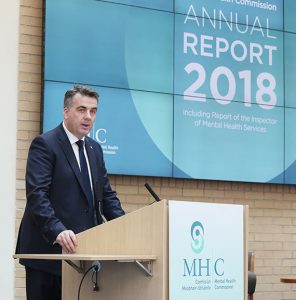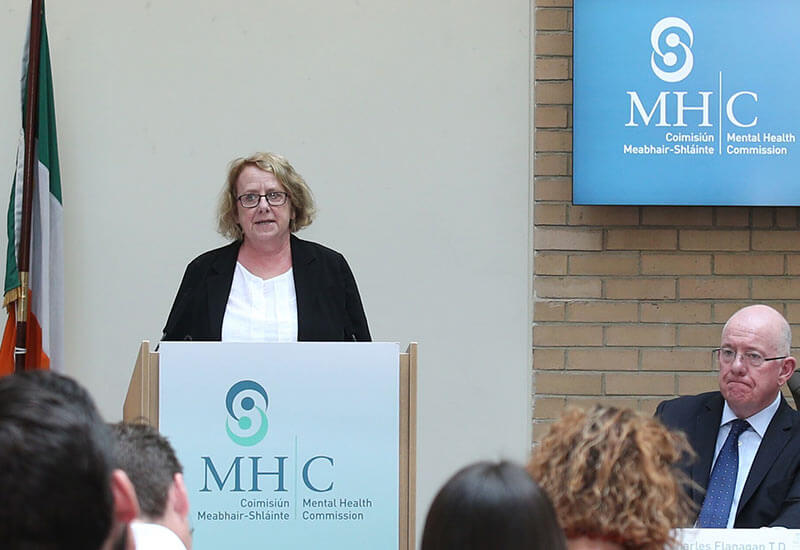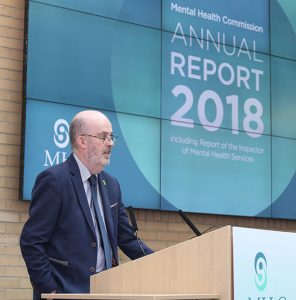The Chief Executive of the Mental Health Commission, John Farrelly, has said that it is difficult to see how some of the country’s in-patient mental health units could be registered in the future without significant improvements in levels of compliance. Maureen Browne reports.

Speaking at the launch of the Commission’s 2018 Annual Report last week, Mr. Farrelly said that there is “a significant governance and management deficit” within Ireland’s mental health services, and referred to some of the evidence cited by the Inspector of Mental Health Services, Dr. Susan Finnerty, in her annual review.
In the Inspector’s report on mental health services in Ireland in 2018, Dr. Finnerty stated that “there was a serious concern with hygiene and maintenance in a significant number of approved centres. The degree of dirtiness and shabbiness is unacceptable … and shows disrespect for patients’ dignity.”
Under the regulation for premises, Dr. Finnerty reported that 70 per cent of approved centres (in-patient mental health services registered by the Commission) remained dirty, malodorous and poorly maintained. A number of centres remained unsuitable and not fit for purpose.

“It is important to note that overall compliance for the centres that we regulate increased from 76 per cent compliance in 2017 to 79 per cent last year. That is positive – and we welcome those trends,” said Mr. Farrelly.
Dr. Finnerty stated that “there was a serious concern with hygiene and maintenance in a significant number of approved centres.”
“However, there is a significant number of approved centres which have – on a consistent and sustained basis – failed to provide the most basic and fundamental aspects of a service, such as privacy and cleanliness.
“There is no justification for some of the low levels of compliance evidenced in the Inspector’s report. It points to a significant governance and management deficit within our mental health services. The Commission will continue to work with providers but it is difficult to see how some of the lowest compliant centres could be registered in the future without significant improvement.
“Hope and dignity are key elements of any mental health service and, from the evidence of this report, not all approved centres are providing that – either through the service itself, or the physical buildings in which they operate.”
Child and adolescent mental health services
The annual report also highlighted ongoing concerns around child and adolescent mental health services. While the total number of admissions of people under the age of 18 to approved centres in 2018 was 408 (down from 439 in 2017), there were 84 admissions of children and adolescents to 18 adult units during the year.
“The placement of any child in any adult unit indicates a gap in service provision,” said Mr. Farrelly. “A child or adolescent’s first introduction to mental health care should not be through a service or building which is not specifically equipped to deal with their needs.”
There were 84 admissions of children and adolescents to 18 adult units during the year.
Physical restraint and seclusion
Of the 27 centres that continued to use seclusion in 2018, 67 per cent were non-compliant with the rules, while of the 52 approved centres that used physical restraint during the year, just 19 per cent were compliant with the relevant code of practice.
“The Inspector’s report clearly indicates a systemic risk developing in relation to the physical restraint and seclusion of patients in approved centres,” said Mr. Farrelly. “In 2018, the Commission initiated its first ever prosecution under the Mental Health Act 2001 on foot of findings that some patients were deprived of basic dignity and human rights by being secluded in a room that was dirty, malodorous, badly lit and badly ventilated. Unfortunately, based on the data, the pattern of poor practice in relation to seclusion and physical restraint is not limited to one or two centres but is more widespread. The Commission has commenced a process to ensure that the system changes and becomes compliant with the rules.”
Individual Care Planning
The Inspector’s report also found that more than 40 per cent of approved centres were non-complaint with Regulation 15: Individual Care Plans – a care and treatment plan agreed between the service user and the mental health team to address their mental health needs.
“There have been ongoing challenges in turning individual care planning into a live, person-centred, recovery-focused and fully participative process, even where all requirements of the regulation are met,” stated Dr. Finnerty. “Of great concern is non-compliance due to the lack of resident involvement in their own care plan. There needs to be a greater understanding that we develop care plans with the resident – reflecting their goals and strengths – and not for them.”
Shortage of mental health staff
The report also underlined a national shortage of mental health staff, which, the Inspector explained, can affect continuity of care and safety of residents. The Inspector referenced the fact that some approved centres had none or very little input from an occupational therapist, which added to isolation, institutionalisation, boredom and challenging behaviour, particularly where people were in approved centres for long periods of time.
Unregulated residences and rehab and recovery
The Inspector’s report summarised the findings of two themed reports which addressed specifically-chosen areas of mental health service provision.
Firstly, in the second year of a three-year programme of inspections across ‘24-hour supervised residences’, the Inspector remained concerned about their condition and the disregard for human rights of the people who lived there. This concern was heightened by the fact that these residences were not regulated, leaving residents open to the risk of abuse.
Secondly, the Inspector also looked at rehabilitation and recovery services and found that just 20 rehabilitation teams were available across all nine HSE Community Health Organisations, despite the 2006 policy document, ‘A Vision For Change’ recommending that there should be 39 teams nationally (one team per 100,000 population). Today, taking into account an 11.1 per cent population increase to 4.76 million (according to the 2016 census), there were now 47.5 teams required to provide a comprehensive national rehabilitation service
Physical health
The Inspector also summarised the findings of her report on the physical health of people with severe mental illness. The Inspector found that residents in long-term care were not being adequately monitored for serious physical illness – which they haw a higher risk of developing than the general population – and there was widespread lack of access to essential healthcare such as physiotherapy, speech and language therapy, dietetics and seating assessments.
The report also underlined a national shortage of mental health staff, which, the Inspector explained, can affect continuity of care and safety of residents.
Governance Mental Health Commission Chairperson, John Saunders, said that while a planned, costed and funded capital investment programme was required to make a significant number of in-patient units fit for purpose, it was clear that a more comprehensive and holistic plan of change was required, involving all service providers, service users, Government and other key stakeholders.

“It is evident from the 2018 report that the level of change in our mental health service provision is uncoordinated, ad hoc and slow,” he said. “A top-level view of our work in 2018 indicates three sustained and key challenges for the mental health care system in Ireland. We must put in place a system of governance that drives best practice across the whole country; we must ensure that the specialist in-patient approved centres are up to standard; and the Government needs to continue moving the
treatment and recovery model to specialist professional community care.”
There were 2,435 involuntary detentions in approved centres in 2018. The Commission coordinated over 2,000 tribunals to ensure that the human rights of detained persons were vindicated.
“We want service users and their loved ones to know that these review processes are independent and exist to ensure that they are receiving high-quality and safe mental health services,” said Mr Farrelly. “The Mental Health Tribunals are a key mechanism by which the Irish State ensures people’s rights are vindicated.
Decision Support Service
The annual report also detailed the extensive work undertaken during 2018 to support the roll-out of a fully-operational Decision Support Service (DSS). The establishment of the DSS extended the remit of the Commission beyond mental health services to include all relevant persons in Ireland who might require supported decision-making.
“Our work since the beginning of 2018 has included organisational design, scoping of the service, project governance, customer journey mapping, and significant stakeholder engagement across key sectors such as healthcare, education, law, and the courts service,” said DSS Director, Áine Flynn.
“Progress since the start of 2019 has included the appointment of a DSS senior management team; the commencement of a website project; and the development of Codes of Practice to guide healthcare and other professionals.”

